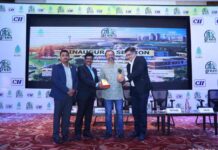Pradeep Kumar Panda
Economic Growth: Odisha is one of the fastest-growing states in the Country and is expected to grow at 10.1 percent in 2021-22 which is higher than National growth rate of 8.8 percent. Industry sector is expected to grow strongly by 14.5 percent largely due to the stellar performance of manufacturing and mining and quarrying sub-sectors which grew at 14.3 percent and 18.1 percent respectively. The services sector is estimated to grow by 7.9 percent in 2021-22. Agriculture and allied sectors GSVA are likely to contract by 3.4 percent in 2021-22 largely due to the incidence of natural calamities like drought, unseasonal rain and cyclone JAWAD, GULAB and YAAS.
Share of Different Sectors of the State’s Economy: The share of Agriculture & Allied in GSVA is 20.06 percent, Industry Sector share is 39.5 percent and share of service sector is 39.9 percent.

Per capita Income: Per capita income has grown significantly at 16.8 percent in 2021-22, to reach Rs. 1,27,383 from Rs. 1,09,071 in 2020-21.
Unemployment Rate: Further as per the Survey Report the unemployment rate of Odisha declined from 7.1 percent in 2017-18 to 6.2 percent in 2019-20 in comparison to 4.8 percent at National level.
Inflation: The inflation rate in the state was also low at 2.7 percent in 2021-22 (April-January) compared to 5.3 percent at all India level during the same period.
State’s Fiscal Position: With sustained revenue collection and better expenditure management, the state has consistently reported a revenue surplus and maintained fiscal deficit within the FRBM Act mandated level of 3.5 per cent of GSDP. Revenue receipts in the state has increased significantly in 2021-22 (BE) at 17.2 per cent to reach INR 1,25,600 crore from INR 1,07,200 crore in 2020-21. The high share of developmental expenditures at 72.7 per cent (2021-22 BE) in total expenditure is a positive indicator and shows state’s commitment towards overall socio-economic development.

Power situation: Odisha is a power surplus state with power availability exceeding the demand. The total installed capacity of all power projects (including share of power from central and other sources) in the state was 8018.25 MW in 2020-21 in comparison to 7676.69 MW in 2019-20.
Urban Growth: As per the Ministry of Health and Family Welfare, the urban population in the state was estimated at 84 lakhs in 2021 which was close to 18.5 per cent of the total population of Odisha. Bhubaneshwar, one of the two ‘smart cities’ in Odisha secured the fourth rank among the top ten capital cities in India, in the ease of living index, 2021, released by the Ministry of Housing and Urban Affairs. In 2021, Puri became the first city in the country, to provide ‘Drink from Tap’ facility under the SUJAL mission of the government. It is also targeted to provide similar facility to all other Urban Local Bodies by 2025. Under the Buxi Jagabandhu Assured Drinking water to all Habitation (BASUDHA), the state is also providing universal coverage of piped drinking water supply to all rural people. The state has targeted to provide safe drinking water in all villages by 2024-25.

Improved Health Indicators: Health expenditure as percentage of GSDP in the state has increased from 1.19 per cent in 2019-20 to 1.59 per cent in 2021-22. The Neonatal Mortality Rate (NNMR), Infant Mortality Rate (IMR) and Under-5 Mortality Rate (U5MR) are continuously declining which indicates the improved health outcome in the State. As per NFHS-5 (2019-21) the prevalence of NNMR stood at 27, IMR at 36.3 and U5MR at 41.1 per 1000 live births declining from 28, 40 and 48 in NFHS-4 (2015-16) respectively. The state has taken several steps towards full Immunization. As per NFHS-5 (2019-21), Odisha has notably immunized 90.5 percent of its children aged 12-23 months as against the national average of 76.4 per cent. The Maternal Mortality Ratio dropping to 136 in 2017-19 from 180 in 2014-16.
Empowerment of Women: Odisha government is actively engaged in building an empowered society. Through Mission SHAKTI, 70 lakh women are engaged in economic activities as members of 6.02 lakhs of Women Self Help Groups (SHGs). Gender empowerment of the State is also reflected in the recently concluded Panchayati Raj Election of 2022. 50 per cent of the seats reserved for women from Ward to Zilla Parishad level. As a result, 56 per cent women are chosen as village Sarpanch, 57 per cent as PS member, 66 per cent as PS chairperson, 55 per cent as Zilla Parishad Member and 70 per cent as Zilla Parishad President.

High Gross Enrolment Ratio: Gross Enrolment Ratio (GER) at the elementary level is maintained at a high level over the past five years reaching 102.2 per cent for primary level and 98 per cent for upper primary. GER in higher education has increased from 16.10 in 2010-11 to 22.10 in 2018-19.
Decline in Poverty: The incidence of absolute poverty has declined significantly in the state. Multidimensional Poverty Index (MPI) of NITI Aayog shows that in comparison to India (25.01 per cent), the MPI Head Count Ratio is higher in Odisha (29.35 per cent). But, the intensity of poverty is lower in Odisha (46.42 per cent) in comparison to all India level (47.13 per cent).
(Writer is an economist based in New Delhi. Views are personal)
#Economicgrowth #economy #Economicsurvey #Odishaeconomy #Percapitaincome #GrossEnrolmentRatio #NITIAyog #Socioeconomicgrowth #Urbangrowth #MultidimensionalPovertyIndex


























